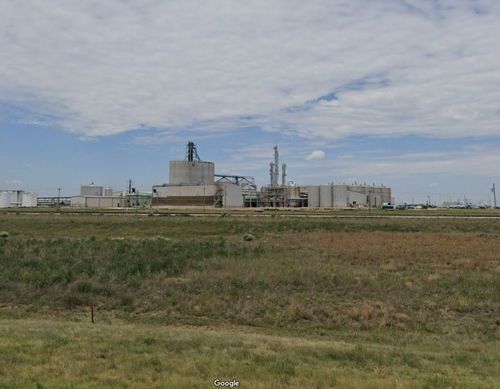Conestoga to host SAFFiRE cellulosic ethanol pilot plant

Arkalon Energy is a 115 MMgy ethanol plant located in Liberal, Kansas. / SOURCE: Google Streetview
November 28, 2023
BY SAFFiRE Renewables LLC
Conestoga Energy and SAFFiRE Renewables LLC announced today their agreement for Conestoga to host SAFFiRE’s cellulosic ethanol pilot plant at Conestoga’s Arkalon Energy ethanol facility in Liberal, Kansas. The SAFFiRE pilot project aims to validate and demonstrate the commercialization of SAFFiRE’s corn-stover-to-ethanol technology in a fully integrated pilot facility that processes 10 tons of corn stover per day. Both Conestoga and SAFFiRE are focused on producing ultra-low carbon intensity (CI) ethanol for use in renewable fuels, making this a synergistic relationship.
The cellulosic ethanol from the SAFFiRE pilot project and potential future commercial facilities is planned to be upgraded to ultra-low CI sustainable aviation fuel (SAF) in support of the aviation industry’s decarbonization efforts. SAF is fuel produced from non-fossil fuel sources that can result in lower greenhouse gas (GHG) emissions than conventional jet fuel on a lifecycle basis. SAF is a drop-in fuel when blended with conventional jet fuel and is crucial to decarbonizing aviation.
Advertisement
Advertisement
SAF’s lower carbon intensity makes it an important part of reducing aviation GHG emissions, which make up 9 percent–12 percent of U.S. transportation GHG emissions, according to the U.S. EPA.
“Conestoga is excited to work with SAFFiRE Renewables on this transformative opportunity. This agreement ties in well with Conestoga’s rich history of providing carbon reducing and net zero solutions in the bioethanol space,” said Tom Willis, CEO of Conestoga Energy. “In order to reach stated net zero carbon emission goals by 2050, the aviation industry will have to embrace SAF. SAFFiRE cellulosic ethanol technology is planned to produce ethanol that can be upgraded to SAF that can be cost-competitive with traditional fossil-based jet fuel. Conestoga is proud to be a part this next big step for both the Ethanol and Aviation industries.”
Advertisement
Advertisement
“A tremendous amount of engineering and site design work has been completed and we’re confident that this pilot plant will be the first step toward scaling and commercializing the conversion of corn stover to cellulosic ethanol, which SAFFiRE plans to convert to sustainable aviation fuel through the alcohol-to-jet pathway,” said Tom Nealon, CEO of SAFFiRE Renewables. “This is good for the corn growers, it’s good for ethanol producers, and it’s good for the host communities and the aviation industry. Our pilot plant site selection process was rigorous, and Conestoga exceeded all of our requirements and continues to demonstrate that they are an outstanding partner.”.
Related Stories
The USDA significantly increased its estimate for 2025-’26 soybean oil use in biofuel production in its latest World Agricultural Supply and Demand Estimates report, released July 11. The outlook for soybean production was revised down.
The U.S. Energy Information Administration maintained its forecast for 2025 and 2026 biodiesel, renewable diesel and sustainable aviation fuel (SAF) production in its latest Short-Term Energy Outlook, released July 8.
XCF Global Inc. on July 10 shared its strategic plan to invest close to $1 billion in developing a network of SAF production facilities, expanding its U.S. footprint, and advancing its international growth strategy.
U.S. fuel ethanol capacity fell slightly in April, while biodiesel and renewable diesel capacity held steady, according to data released by the U.S. EIA on June 30. Feedstock consumption was down when compared to the previous month.
XCF Global Inc. on July 8 provided a production update on its flagship New Rise Reno facility, underscoring that the plant has successfully produced SAF, renewable diesel, and renewable naphtha during its initial ramp-up.
Upcoming Events










